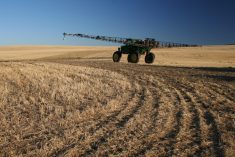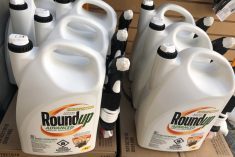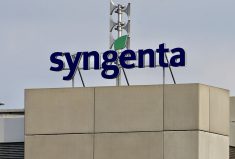London/Frankfurt | Reuters –– Agricultural companies Monsanto and Syngenta are working with investment banks on a takeover deal that would create an industry behemoth with combined sales of more than US$31 billion, three sources familiar with the matter said.
Swiss crop chemicals maker Syngenta is working with Goldman Sachs to assess the merits of a sale to the world’s largest seeds company Monsanto, which is being advised by Morgan Stanley, the sources said.
Rumours of talks between the two companies gained momentum at the end of April, sending shares in Syngenta to a record high of 351 Swiss francs (C$461) on May 4 before easing amid a broad decline in equity markets.
Read Also

Alberta crop conditions improve: report
Varied precipitation and warm temperatures were generally beneficial for crop development across Alberta during the week ended July 8, according to the latest provincial crop report released July 11.
Spokesmen at Monsanto, Syngenta, Goldman Sachs and Morgan Stanley declined to comment.
U.S. company Monsanto, which initially approached Syngenta last year, has long been interested in its Swiss rival and the potential to base itself in Switzerland and benefit from lower taxes, one of the sources said.
Following attempts by the U.S. Treasury to clamp down on such moves, known as tax inversion, Monsanto may have to buy Syngenta in a cash rather than stock transaction and would be unable to redomicile in Switzerland, an industry source said.
The St Louis-based group, however, might struggle to finance such a deal, which could cost up to $40 billion, and may need to find a partner to take on Syngenta’s U.S. seeds business before launching a takeover bid, another person familiar with industry said (all figures US$).
Monsanto foresees strong benefits from a takeover of Syngenta, which makes heavy research and development (R+D) investments in crop technology to increase the average productivity of crops such as corn, soybeans, sugar cane and cereals.
Monsanto, meanwhile, is focused on conventional and biotech seeds and last year raised its R&D spending to $1.7 billion from $1.5 billion in 2013.
“There is a clear strategic logic to a deal,” one of the industry sources said. “Syngenta is the only available target in crop protection. It’s no wonder Monsanto continues to circle the company.”
A deal would come as prospects for genetically modified (GM) crops are improving in the European Union after a change in its legislation unlocked a stalled approval process. Monsanto owns the only GM product approved for cultivation in the EU, a modified maize.
Despite the two companies’ cultural affinity, a merger may be challenged by antitrust regulators, primarily in North America, where the two groups are already seen as market leaders in the seeds industry.
Syngenta would need to go through a portfolio clean-up and carve out its U.S. corn and soybean businesses, said a banker close to other potential bidders weighing their options, hoping to derail a deal that would reshape the industry.
Rival suitors?
German chemicals company BASF and U.S. petrochemicals group Dow Chemical could be among possible bidders for all or parts of Syngenta, one of the sources said.
He mentioned Chinese state-owned firm, China National Chemical Corp. (ChemChina), as another possible buyer with strong appetite to bulk up its European presence, though Syngenta may be reluctant to cede control to an Asian rival.
“No one wants to make the first move,” the source said. “Everyone is waiting to see the level of the first bid before reacting.”
Syngenta has not been open for any deal, another source said. “They are a proud Swiss company. They see themselves as market leader and wouldn’t agree to anything without a fight.”
Spokesmen at BASF and Dow Chemical declined to comment, while representatives of ChemChina were not immediately available for comment.
Syngenta, which was formed in 2000 by the merger of Novartis Agribusiness and Zeneca Agrochemicals, also competes with Bayer CropScience and DuPont Pioneer.
— Pamela Barbaglia and Arno Schuetze are Reuters correspondents covering mergers and acquisitions (M+A) from London and the banking sector from Frankfurt respectively. Additional reporting for Reuters by Greg Roumeliotis and Mike Stone in New York and Sybille de La Hamaide in Paris.




















